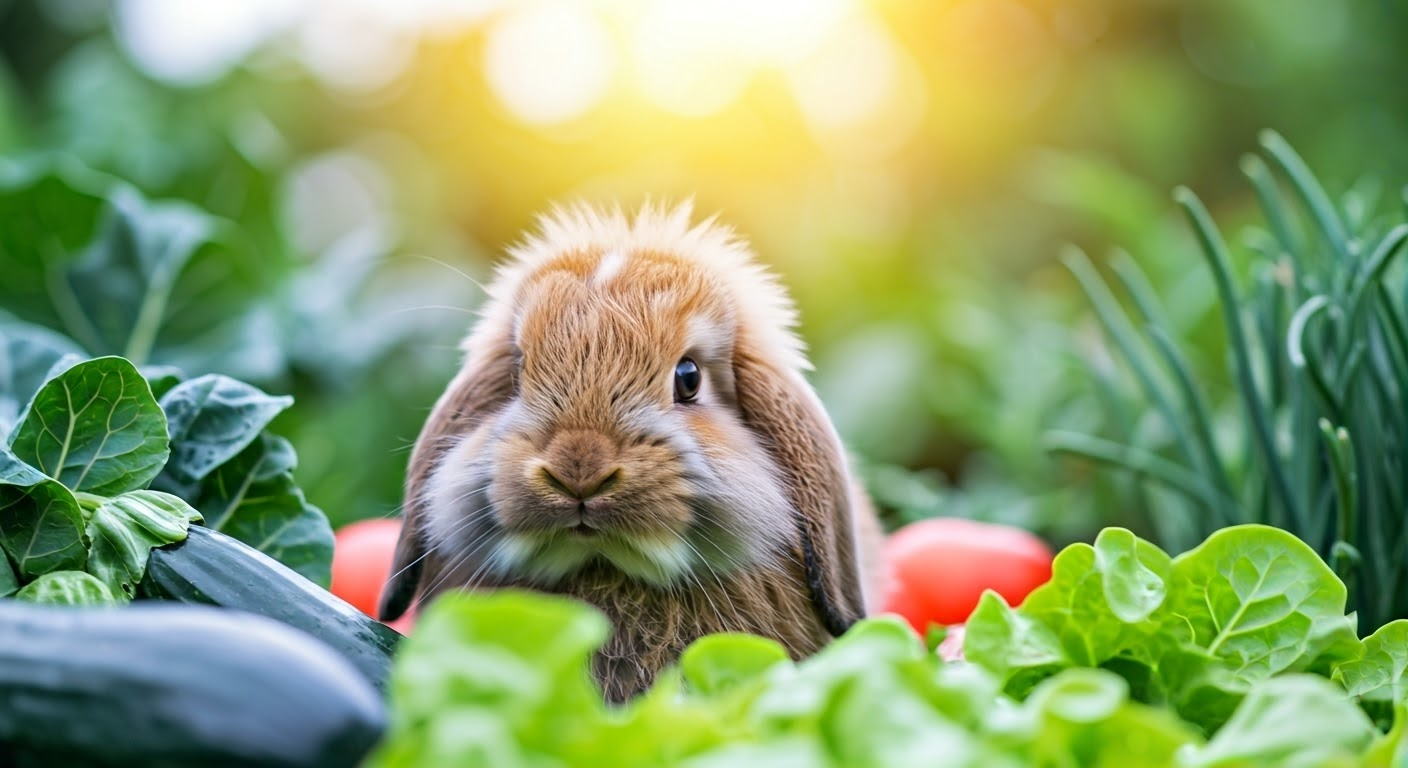Key Highlights
- Scurvy is rare in rabbits, but it’s important to know about their vitamin C needs for good health.
- Rabbits can make their own vitamin C, unlike guinea pigs, but sometimes they need extra help.
- A diet full of fresh, good-quality hay is key for a rabbit to get enough vitamin C.
- Watching how your rabbit acts and looks can help you notice any health issues, like scurvy.
- Talk to your veterinarian about the right vitamin C supplements, especially during stress, sickness, or recovery.
Scurvy happens when there is not enough vitamin C in the body. It is more common in guinea pigs than in rabbits. This is because rabbits can produce their own vitamin C, but guinea pigs cannot. However, rabbits can still get scurvy, so it is essential to understand their nutritional needs. Meeting their vitamin C needs is very important for their health, well-being, and immune system support.
Understanding Scurvy in Rabbits

Scurvy is not very common in rabbits like it is in some other small pets. Still, rabbit owners should know about it. A balanced diet is important for your rabbit’s health. If you recognize the signs of health problems, you can help keep your furry friend healthy.
Scurvy is a health problem caused by a lack of vitamin C. Many animals, like rabbits, manage their vitamin C levels better than other creatures. This helps them avoid scurvy and stay healthy.
What is Scurvy?
Scurvy is a health problem that happens when we do not get enough vitamin C in our diet. Vitamin C is important for many functions in the body. It helps make collagen, heal wounds, and strengthen the immune system. When a person has scurvy, they may feel weak and tired. They might also bruise easily.
People and some animals, like guinea pigs, cannot create their own vitamin C. But other animals, such as rabbits, can make their own vitamin C. This is a good idea because it helps them avoid scurvy.
Some factors can impact a rabbit’s ability to produce enough vitamin C. For example, being sick or having a bad diet can reduce the amount of vitamin C they make. This highlights the importance of good nutrition and proper care for their health.
How Rabbits Process Vitamin C
Rabbits can make vitamin C because of a special enzyme called L-gulonolactone oxidase. This enzyme helps them change glucose into ascorbic acid. Ascorbic acid is the scientific name for vitamin C.
Usually, this process provides rabbits with enough vitamin C. However, wise rabbit owners should not rely only on this natural feature. A rabbit’s diet is really important for their overall health. They can still miss out on necessary nutrients, even if they can produce vitamin C.
A balanced diet is very important. It should have fresh hay, vegetables, and good-quality rabbit pellets. This will help keep vitamin C levels high. It also supports your rabbit’s overall health.
Signs and Symptoms of Scurvy in Rabbits

Recognizing the signs of scurvy in rabbits is the first step to treat it. Scurvy is rare, but knowing the symptoms is important. You should never ignore any changes in how your rabbit acts or looks.
- Pay attention to small changes in behavior.
- Look for clear physical signs.
- Being aware can really help.
Physical Indicators
One clear sign of scurvy in rabbits is weight loss. You might notice they have less appetite, feel low on energy, and could have diarrhoea. Scurvy can affect collagen production, which may lead to other health issues in your rabbit.
Here are some signs to notice in rabbits that have scurvy:
- Lameness or Trouble Moving: Scurvy can cause pain and stiffness in the joints. This may make it difficult for your rabbit to move well.
- Swollen Joints: Inflammation in the joints happens often with scurvy. You might notice swelling.
- Dental Problems: Issues with teeth, such as overgrown teeth or bleeding gums, can mean a lack of vitamin C.
- Rough or Matted Fur: A dull coat can indicate several health problems, like scurvy.
If you notice any signs of scurvy in your rabbit, contact your vet as soon as possible.
Behavioral Changes
Rabbits with scurvy may show changes in their behaviour along with their physical changes. It’s important to notice these behaviour changes quickly. Taking care of them early can prevent serious health problems.
Rabbits are prey animals. This means they usually hide when they feel sick. However, small changes in their behavior can help alert careful owners.
If you notice your rabbit seems more tired, hides often, or doesn’t want to play or interact, you should schedule a visit with your veterinarian. Remember, changes in your pet’s behavior can sometimes indicate a health issue and should not be overlooked.
Preventing Scurvy in Rabbits
The good news for rabbit owners is that you can easily prevent scurvy. To do this, you need to take good care of your rabbit and pay attention to what they eat. Regular vaccinations are important too. A rabbit’s nutritional needs are straightforward. Providing them with a balanced diet helps keep scurvy and other health issues away.
A good diet for your rabbit should include high-quality hay, fresh vegetables, and special rabbit pellets. This is important for keeping your rabbit healthy.
Essential Diet for Rabbit Health
Rabbits need a balanced diet to stay healthy and avoid obesity, just like we do. A key part of a good rabbit diet is high-quality grass hay. Timothy hay is an excellent option and should make up most of their daily food. It provides important fiber for good digestion and helps wear down their constantly growing teeth.
Fresh vegetables are very important. They provide a good source of vitamin C and other key nutrients.
Here’s what you should add to their daily diet:
- Green Leafy Vegetables: Serve various dark leafy greens, like romaine lettuce, cilantro, parsley, and dill.
- Other Vegetables: Include small portions of other vegetables such as bell peppers, zucchini, and carrots.
- Fresh Water: Always make sure there is fresh, clean water available for drinking.
Supplements and Their Role
A balanced diet usually gives rabbits enough vitamin C. But sometimes, they might need supplements for better health. Young rabbits, pregnant rabbits, nursing rabbits, or sick rabbits could need extra vitamin C. This can help boost their immune systems and support their overall health.
It’s important to talk to your veterinarian before adding any supplements to your rabbit’s diet.
|
Supplement |
Benefits |
Considerations |
|
Vitamin C Tablets |
Provide additional vitamin C in easily measurable doses |
Follow your vet’s instructions. |
|
Vitamin C-Rich Foods |
Natural sources of vitamin C |
Offer a variety of fresh vegetables daily. |
Conclusion
In summary, it is important to know how to prevent and treat scurvy in rabbits. A good diet that includes enough vitamin C is essential. You should watch for signs that show they might have a deficiency. By doing this, you can help avoid health problems for your furry friends. A proper diet is very important for their happiness and well-being. If you have any worries about your rabbit’s health, ask a veterinarian. Your rabbits need the best care to feel good!
Frequently Asked Questions
Can rabbits recover from scurvy with proper care?
Yes, if you get fast help from a vet and ensure your rabbit has enough vitamin C, most rabbits can fully bounce back from scurvy. Your vet might recommend vitamin C supplements to help your pet recover quicker and support their overall health.

Hi, I’m Sondip,
I’m a writer who loves to help people solve their problems. I write about small animals like mice and other small animals and even pests.

